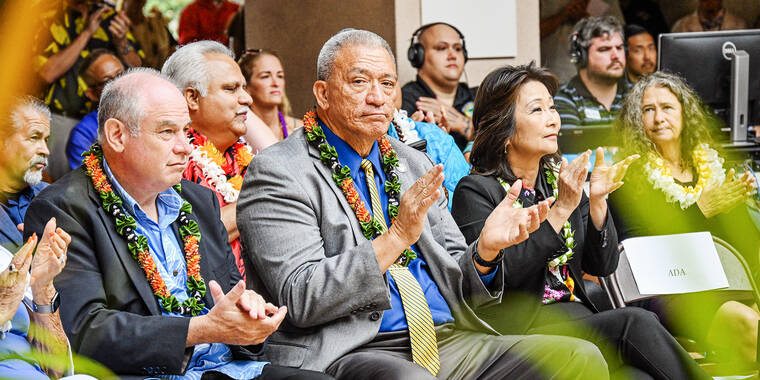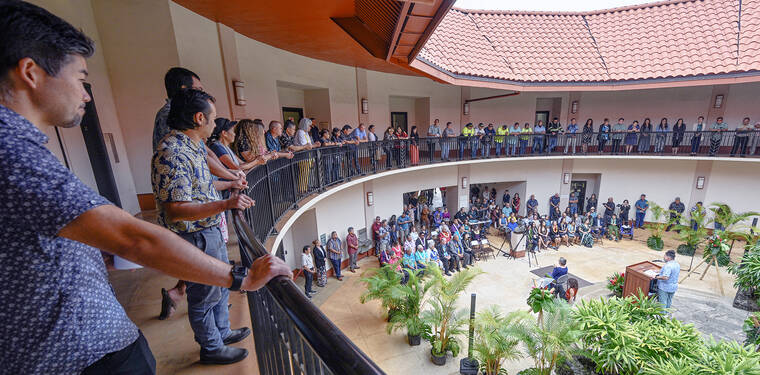LIHU‘E — In his sixth State of the County address since taking office, County of Kaua‘i Mayor Derek S.K. Kawakami laid out a sweeping plan for the island as he navigates a final term in office.
The plan ranges from preparing for adversity to the planning of stronger and smarter communities that are resilient to a constantly shifting climate so families can prosper for generations.
“If we prepare for adversity and plan for changing environments, we can build a safe and thriving community that cares for our families, from keiki to kupuna,” said Kawakami in a prepared speech delivered on Thursday morning at the Lihu‘e Civic Center, Mo‘ikeha Courtyard, before a number of special guests and members of the community.
His speech drew heavily on the devastating Maui wildfires in August 2023 and how those incidents shaped a plan for the future on the island of Kaua‘i. The Lahaina Fire, which tore through the westside of the island of Maui on Aug. 8, claimed the lives of 101 people and destroyed more than 2,000 structures.
“The Maui wildfires revealed a harsh reality that our county must improve our wildfire prevention and response. Many from our emergency response teams assisted in Maui’s recovery efforts and (gained) invaluable first-hand experience that we used to update our own response plans,” said Kawakami before a group of attendees that included County of Maui Mayor Richard Bissen.
To that extent, Kawakami said his administration has budgeted $2.7 million in the next fiscal year to pay for heavy equipment needed to help manage vegetation, as well as an additional $1.5 million to cover costs associated with clearing brush and large debris from county properties.
But that money represents a fraction of a projected operating budget of $344.9 million and a capital improvement budget of $103.6 million. He said the budget also calls for, among other things, an outlay of millions of dollars to address decades of backlogged road repairs while also upgrading public transportation services.
The planning of smarter communities, Kawakami said, requires those kinds of investments in order to prepare for the future.
“We extend our deepest gratitude to our congressional and state delegation for securing nearly $17 million in federal funding toward infrastructure improvements, housing, and environmental sustainable projects right here on Kaua‘i,” he said.
“While we continue to invest in projects that address much needed repairs to our wastewater facilities, we are dedicating $1 million in CIP (capital improvement program) funds to improve resiliency of our Wailua and Waimea wastewater treatment plants, which are both located in tsunami zones. And we’ve dedicated an additional $2.7 million for upgrades and repairs to treatment plants islandwide.”
Affordable housing was also top of mind, as Kawakami pointed to a number of projects in various stages of development, including 40 senior units at Lima Ola in ‘Ele‘ele, which should be completed in September. He said additional housing units for seniors and other groups are eyed around the island.
“We are also in various stages of environmental assessment and design on several other proposed development projects in Puhi, Waimea and Kilauea. In total, we are devoting nearly 90 acres of county land to housing projects that will serve our kupuna, low-income families and our workforce,” Kawakami said.
He later delved into the creation of safe spaces for children to play, mentioning planned improvements to Vidinha Stadium in Lihu‘e and Bryan J. Baptiste Sports Complex in Kapa‘a, as well as the construction of skateparks.
“But I’ve always said that parks should not be solely dedicated to team sports, because not all children fit that mold. Our skatepark in Hanapepe is expected to be complete in November with the next one slated for Nawiliwili,” Kawakami said.
“And with the popularity of our state’s first inclusive playground at Lydgate Park, we are excited to offer another inclusive playground in Waimea with construction starting in summer.”
He also said plans are in the works for the first-ever county equestrian facility with $250,000 dedicated to start the project.
“For decades, our rodeo community has asked for a public facility to host events and be on par with the rest of the state. With the support of our County Council we are pleased to bring this rodeo facility to life right here in Lihu‘e,” Kawakami said.
Near the end of his speech, he extended a helping hand to County of Kaua‘i employees.
“We know the rising cost of living on Kaua‘i makes it harder for working families to make a living and many are leaving for the mainland. Unfortunately, I can’t set salaries or wages for government positions, but with the support of our labor unions, we are dedicating more than $3 million of our county budget to pay the full cost of our basic health care premiums,” Kawakami said.
“That means every county employee on a 75-25 HMSA (Hawai‘i Medical Service Association) or Standard Kaiser health care plan will pay nothing for those plans. Oh … and we’re paying for prescription, dental and vision care, too. That’s up to $200 a month going right back to our associates’ paychecks.”





We need sewer systems in Koloa and Poipu for residents!!! Our biggest barrier to affordable housing and ADU’s……
Kaua’i needs large landowners like Grove Farm to manage their vegetation to decrease wildfire risks,,, especially in Poipu,,,